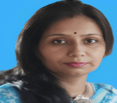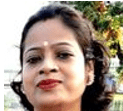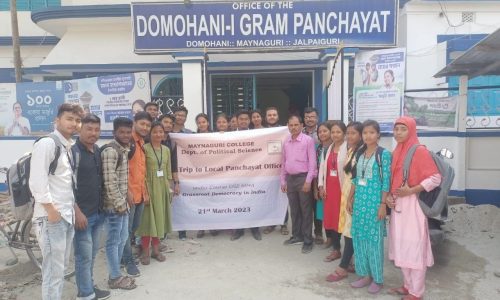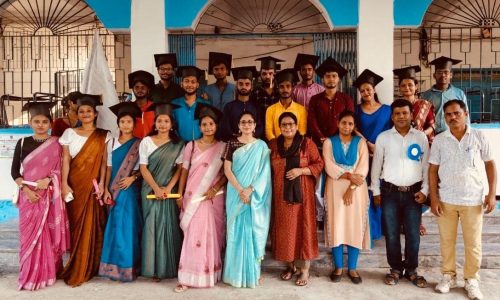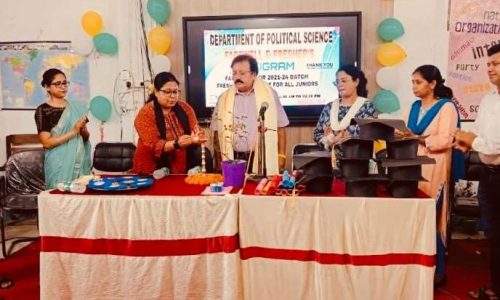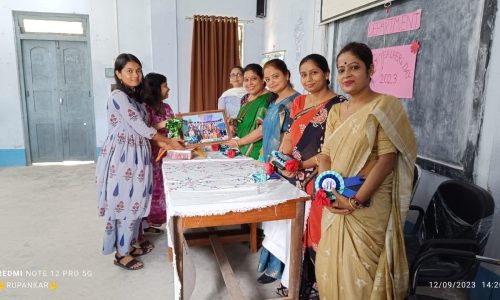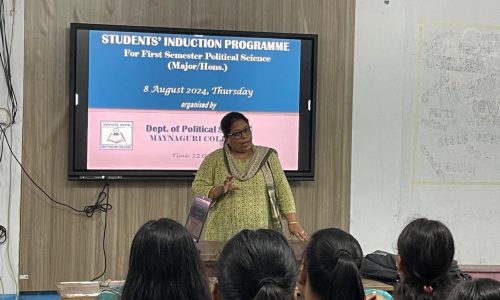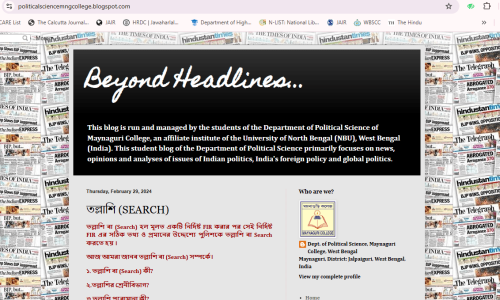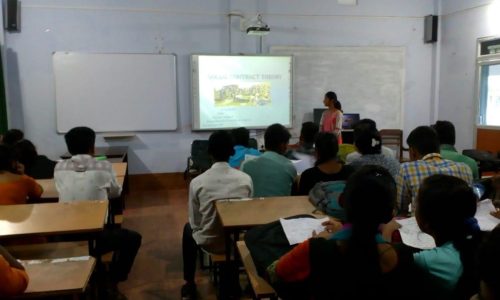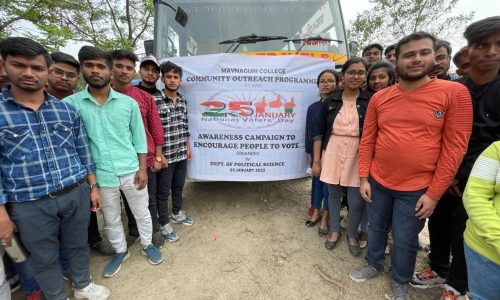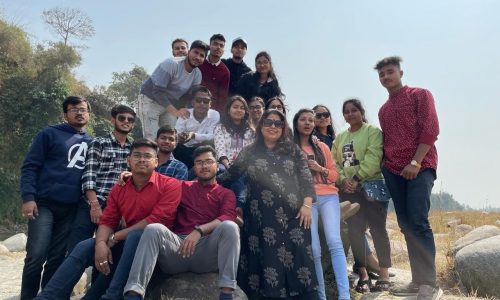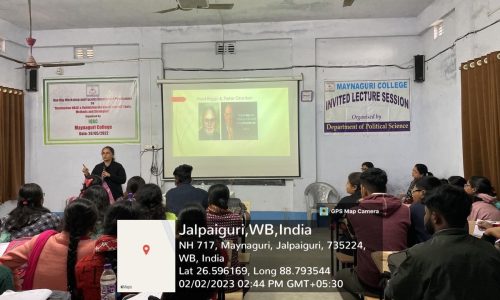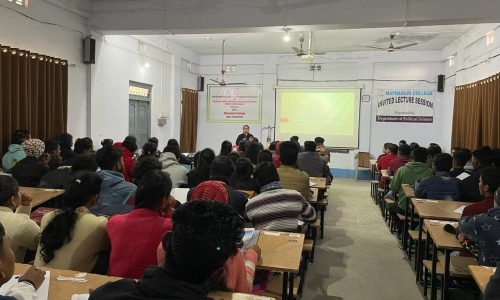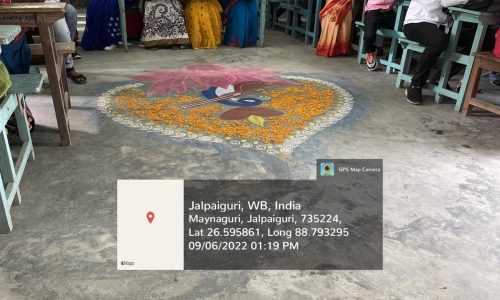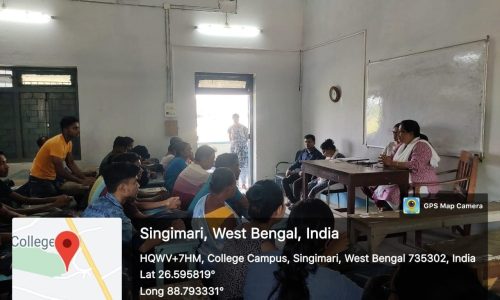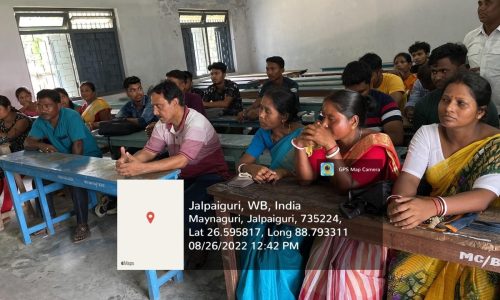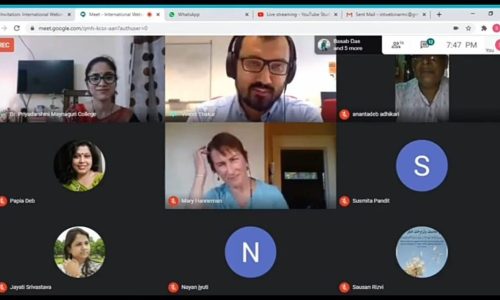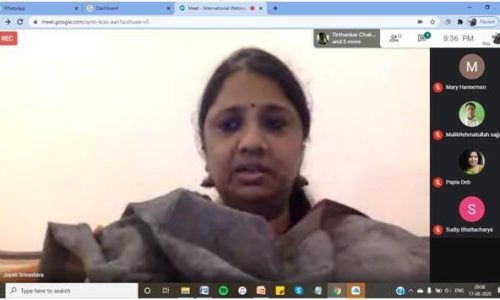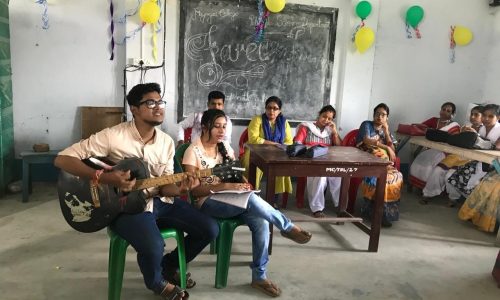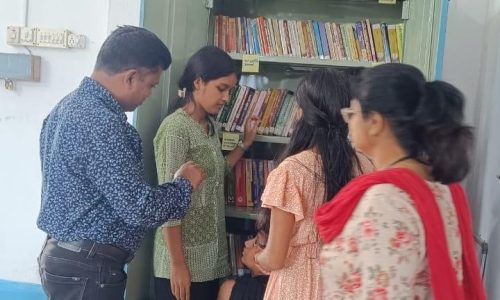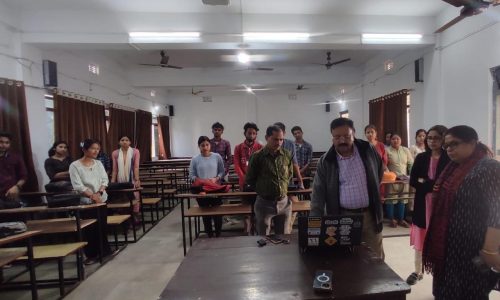Dept. of Political Science
B.A. Courses
Department of Political Science
About The department
Department Notice
Vision of the Department –To Educate, Empower and Lead: Creating conscionable Citizens)
Mission of the Department--To develop the ability to imagine beyond the given
- Foster holistic and skill-based development of the learners through interdisciplinary and multifaceted education;
- Enable the learners to critically assess and introspect issues around contemporary debates and develop a critical self-reflection concerning the life-world of our society;
- Sensitize the learners about socio-cultural diversity to shape an inclusive Indian democratic system;
- Nurture lifelong inspired learners with advanced socio-political knowledge in a digitally-driven and ever-changing world.
Objectives of the Department
- To make the learners future-ready through:
- Knowledge transmission;
- Imparting communication and problem-solving skills;
- Imparting democratic and ethical values;
- Honing leadership skills.
Why study Political Science?
Studying political science grounds students in the importance of political participation and prepares them to take part in the political life of their communities and the nation. The study of political science also helps us understand the factors that contribute to social injustice and human rights violations. It enables us to analyze policies and institutions that perpetuate inequality and oppression, and develop strategies to promote greater fairness and equal opportunity.
A political science degree will help learners to understand political decision-making and all the theories, ideas and ideologies that influence this process. The learners will also learn how to address and approach issues ranging from local conflicts to global challenges.
These will serve a learner well if she/he/they indeed pursue a job in politics, public policy or any number of public or private organizations. However, they can also be transferred to any other career path that she/he/they might take.
The things a learner will learn from the discipline of Political Science will also make them savvier about the politics taking place every day, both in their communities and on the world stage. They will graduate with knowledge of:
- What politics is all about and theories about how it works;
- The causes and consequences of political issues and crises;
- Who wins and loses political contests (and why);
- How politics operates differently at local, national and global levels;
- The impact and influence that institutions and ideas can have on politics;
- The contrast between democratic and authoritarian regimes;
- How to conduct research in politics and public policy.
Career Options for Political Science Graduates:
- Civil Services (IAS/IPS/IFS and allied services conducted by the UPSC and the State Civil Services);
- Diplomats (through the Indian Foreign Service);
- Public Policy advisers;
- Politicians;
- Journalists;
- Foreign Affairs specialists;
- Political Analysts;
- Advocacy Coordinators;
- Political Campaign Managers;
- Local Government Legislators;
- Political Consultants;
- Academics (Professor/Research Associate);
- School Teachers (recruited through the SSC Exams and others).
Achievements
- Maynaguri College is located in the rural belt of northern parts of West Bengal. Given the socio-economic background of the population that inhabits this area, most of our students who enroll in various courses are first generation learners. As a result, drop-out rates are very high in various courses. The Department of Political Science has consistently motivated the learners to continue their education and complete their degrees. The Dept. accordingly boasts of a successful track record of sustaining low or near zero drop-out rates in the Honours courses.
- Every year quiet a significant number of students (who have graduated with Honours degree from this Dept.) have got admissions in Post-graduate courses in some of the premier institutions of higher education within the state (apart from the University of North Bengal) like Jadavpur University, Presidency University, University of Kolkata and others.
- Students who have graduated from the Dept. have consistently cleared NET/SET examinations every year.
- During the COVID pandemic, teachers regularly conducted online classes initially through Skype and later through Google Meet so that the teaching learning process did not suffer due to the countrywide lockdown. Those online class lectures had been methodically recorded and students make frequent use of those vast repertoire of academically rich resources along with the online study materials and readings that were circulated.
- In the Post-Covid phase, the Dept. has shifted its departmental activities to hybrid mode (both online & offline). Teachers take both online and offline classes to complete their scheduled courses. Seminars/Special Lectures/Invited Lectures are conducted in both online and offline modes.
- The Department gives a very strong focus on mentoring the students towards increasing their productivity as a human resource. The Departmental teachers have been consistently playing their roles with elan as experience-driven guides, whose objectives have been to offer insights that help in the process of self-discovery, problem solving and growth of the mentee. The Faculty of the Department has been meticulously trying to refine the skills of the students and have been working towards achieving short- and long-term career goals of the mentee.
- Under Graduate students of the Final Year are also mentored by the Faculty to act as Student Mentors to the First and Second Year students. This practice has significantly strengthened the bond and spirit of team work within the department and has served well to inculcate and hone both the academic & leadership skills of the Final Year students.
- Regular Class Tests and continuous internal evaluation in the form of Surprise Tests, Quizzes, Group Discussions, Student Seminars and Departmental Debate competition are conducted by the Department for providing the learners with a holistic the teaching-learning experience.
- Parents-Teachers meetings are conducted periodically by the Department to apprise the Parents/Guardians of the academic progress of their wards. Parents/Guardians of students who remain absent frequently or for a prolonged spell are especially asked to be present with their wards in such meetings to motivate them to encourage their wards to be regular in their classes.
- The Department diverts special attention towards assessing the learning levels of the students in two ways at the time of the commencement of their programme. Students enrolled in the Course are identified as slow and advanced learners based on their +2 marks and their academic performance during the first week of their classes. This helps to identify the slow learners and to design special remedial or tutorial sessions to bridge the gap between the slow learners and the advanced learners.
- Bridge Courses are also conducted at the departmental level to lift the students to the level of higher education. Bridge courses are conducted at the beginning of the academic year for the students enabling them to cope with the programme to which they are enrolled.
- Remedial Classes are conducted by the Department with an aim to improve the academic performance of the slow learners, absentees and students who participate in state and national level sporting events. This practice helps the struggling learners to improve their subject domain and helps them catch up to their peers. The Department encourages a Group Study System with the help of the advanced learners towards this end.
- The Department regularly conducts Special Lectures/Invited Lectures with eminent professionals and academics of national (in hybrid mode) and international repute (in online mode).
- In order to motivate the Faculty in their research pursuits and academic publications, the Dept. has started Saturday Discussion Group consisting of all the Faculty members of this Dept. Every third Saturday of the month, atleast one Faculty member presents a paper on the latest event/issue (national/international politics) and all the other Faculty members then engage in debates and discussions on the same issue. This Saturday Discussion Group has benefitted the Faculty immensely in bringing out their publications as well.
- Since the new mantra of India’s knowledge economy is ‘information’, students are required to keep themselves abreast of the latest issues of national and global politics. In order to encourage the students to themselves write academic articles on such topics, the Department has started a student run and managed blog titled ‘Beyond Headlines’ https://politicalsciencemngcollege.blogspot.com/
Future Plans:
- Increase the number, quality, and diversity of undergraduate students in the department.
- To hold periodic workshops with class XI & XII students of the nearby schools to drive home the advantages of a Political Science major and its future career prospects.
- Improve communication with the department’s alumni so they may serve as academic role models.
- To start a Post Graduate Course in Political Science.
- To arrange campus placement programs.
- To make more collaboration with society and research institutes.
- To develop NET/SET guidance center for students.
- To start a Community Newspaper to be prepared and published by students of the Department.
- To encourage the faculty in their research endeavours and academic publications.
- To motivate and incentivise the faculty to be more actively involved in the process of organising seminars/conferences/symposia/projects by applying for funds to UGC, ICSSR, etc.
Infrastructure available in the Department:
- Separate Departmental Rooms;
- Departmental Laptop,
- Departmental Library;
- World Map.
Programs Offered
BA (Honors) in Political Science
BA (General) in Political Science
Intake Capacity
———
Syllabus
Study Material
Need Data
Departmental Library Books : 125 books, updation of the catalogue work is in progress.
Seminars & Workshops
Department Faculties
SACT - I || Political Science
Associate Professor || Political Science
Assistant Professor || Political Science
SACT - I || Political Science
SACT - I || Political Science
SACT - I || Political Science
SACT - II || Political Science







